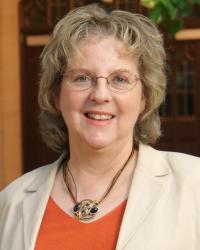Why we will thrive—through thick and thin

Dean
Catherine Emihovich
Happy New Year, and welcome to 2008! Although the new year did not begin auspiciously (the Gators lost their bowl game, the state budget picture is still looking very grim), I still retain a small but durable sense of optimism that events will change for the better, and that this year will improve upon last year.
When I look around the college, I see clear signs of real change and progress:
- excellent faculty undertaking significant research and scholarship, and teaching with innovative technology;
- bright capable students engaged in a variety of service activities and achieving well;
- staff that are dedicated and hard working despite increased workloads;
- and, generous and loyal alumni and friends of the College of Education who provide necessary and critical support for new programs and initiatives that often make an incredible difference for children and families, especially for those in challenged schools and communities.
I feel privileged to lead a college that has so many positive elements in place even as we grapple with complex and difficult challenges in these unsettled times.
One of the defining hallmarks of President Machen’s leadership is his emphasis on sustainability issues, and he has already helped UF to become nationally recognized as a leader in this area. When most people think of sustainability, they tend to assume it applies only to issues such as energy conservation and the “greening” of the campus. But I believe that sustainability can have a much broader meaning, and that it is equally important to apply it to other quality of life issues, such as increased education, better health care, and access to the arts.
From this perspective, the work of many in the College of Education takes on added importance, since it has now become abundantly clear that increasing levels of education are pivotal for having a sustainable life and in overcoming the deleterious effects of poverty. The Southern Education Foundation recently released a report that contained alarming news which will impact the state, and nation’s future. According to their report, over 50 percent of all children in public schools in 15 Southern states are from low-income families, and that many of these children are from ethnic and/or linguistic minorities. Even more disturbingly, if current demographic trends continue across the US, within the next 10 years the majority of students in public schools will be from low-income families.
The social and human costs of these data are staggering, especially when other factors are taken into account, such as the fact that low-income children routinely attend schools with fewer resources and well-qualified teachers. The lack of highly qualified teachers, who are both experts in their content field and who possess deep pedagogical knowledge, is alarming because a highly qualified teacher can increase student achievement by as much as two to three grade levels in a single year. In fact, persuasive evidence exists that if every poor child had access to such a teacher, the persistent and disturbing achievement gap between white and non-white students could be eliminated. Few other investments in education would bring such a massive return, and the quality of life for these children would be immeasurably improved.
In the next few columns, I plan to focus on education as a sustainability concern, and to highlight various initiatives across the college that result in a richer and deeper quality of life. The concept of engaged scholarship has a clear moral and ethical dimension that is often downplayed in academic circles, but the appalling conditions that now exist in many public schools and communities across the nation suggest that this moral dimension of scholarship can no longer be overlooked.
New teaching and learning models must be developed to enable our institutions of higher learning to partner more effectively with preK – 20 schools, community organizations, businesses, and families to create a more sustainable and equitable future for the next generations to come, and I believe that the UF College of Education will be nationally recognized for our part in this overdue transformation.




